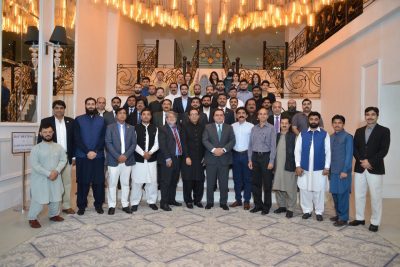
The 09th National Parliamentary Researchers Workshop, held from May 6 to 8, 2025, at the Nishat Hotel, Lahore, brought together a vibrant community of 48 parliamentary researchers representing all six legislative houses of Pakistan i.e. the Senate, National Assembly, and the Provincial Assemblies of Punjab, Sindh, Khyber Pakhtunkhwa, and Balochistan, alongside researchers from the Pakistan Institute for Parliamentary Services (PIPS). The workshop was jointly organized by Pakistan Institute for Parliamentary Services (PIPS) and the Mustehkam Parlimaan Project with utmost aim to build technical skills, foster collaboration, and enhance the analytical capabilities of researchers to support informed parliamentary decision-making.
The event commenced with an Inaugural Session moderated by Mr. Muhammad Rizwan Manzoor, Deputy Director (Research), PIPS. The session opened with the recitation of the Holy Quran, followed by a thoughtful welcome address by Mr. Asim Khan Goraya, Executive Director, PIPS. In his speech, Mr. Goraya emphasized that the workshop reflects PIPS’s enduring commitment to institutional excellence and was especially convened in Lahore to directly benefit the newly expanded research cadre of the Punjab Assembly Secretariat. He underscored that the workshop is not merely a training program but a structured academic and practical engagement aimed at strengthening evidence-based legislative work. Mr. Ali Imran, Senior Expert from the Mustehkam Parlimaan Project, followed with opening remarks that highlighted the project’s sustained efforts in supporting capacity-building of parliamentary staff across Pakistan. Mr. Arif Shaheen, Special Secretary of the Punjab Assembly Secretariat, who represented the senior leadership of Punjab Assembly at the event and expressed appreciation for this timely and much-needed initiative. A group photograph of all participants and guests followed the inaugural, capturing the moment of collective resolve.
The day one was structured to provide a strong academic foundation for the participants. Dr. Mohammad Waseem, Professor Emeritus at LUMS and one of Pakistan’s leading political scientists, led the opening session on “Introduction to the Research Cycle in Social Sciences and Parliamentary Research.” His talk offered a compelling overview of research methods, the philosophy of inquiry, and how these align with legislative functions. Mr. Muhammad Rashid Mafzool Zaka, Director General (Research), PIPS, followed with a session on “Evidence-Based Research,” where he discussed how credible data, institutional memory, and analytical neutrality form the backbone of meaningful legislative input. Ms. Tehseen Khalid, Director (Research), PIPS, led subsequent sessions on “Parliamentary Research Products” and “Referencing in Parliamentary Research,” which introduced participants to various document formats, citation protocols, and international standards in parliamentary research. The day concluded with an interactive session co-facilitated by Mr. Zaka and Ms. Khalid on preparing research briefs and briefing papers, providing participants with practical frameworks for developing concise and relevant research output.
The day 2 of the workshop was dedicated to experiential learning. Participants were grouped and assigned real-life policy topics to work on. Under the mentorship of senior researchers from PIPS and the National Assembly Secretariat, each group collaborated to prepare a research brief, practicing all steps of issue identification, analysis, and synthesis. The afternoon was reserved for group presentations, where each team received constructive feedback. This practicum not only reinforced technical skills but also encouraged peer learning, critical thinking, and teamwork, all essential traits for effective legislative research. The intellectual momentum of the day continued into the final session, conducted virtually by Dr. Zahid Asghar, Professor of Economics at Quaid-i-Azam University. His absorbing presentation on the “Use of AI in Parliamentary Research” explored the integration of generative AI tools, semantic analysis, and large language models in accelerating and enriching legislative research. He offered practical illustrations on how AI can complement traditional methods, enabling researchers to manage time-bound requests more effectively and with greater analytical depth.
On the final day, the focus shifted to emerging themes and applied research in the domain of public finance and digital communication. Professor Dr. Savera Mujib Shami, Chairperson of the Department of Digital Media at Punjab University, delivered an engaging session on “Digital Media: Challenges and Opportunities for Parliamentary Researchers.” Her presentation contextualized the impact of digital platforms on legislative narratives, the risks of misinformation, and the importance of media literacy among parliamentary staff. This was followed by a session conducted by Professor Dr. Waseem Shahid Malik, Public Finance Management Expert at Ministry of Finance, on “Understanding Public Finance and Budget Cycle.” The facilitators simplified technical budgetary processes and the role of Parliament and Provincial Assemblies in formulating and scrutinizing budget. The final learning session, “Budget Research Services for MPs,” was conducted by Mr. Muhammad Rizwan Manzoor, who not only explained the nature of research support during budget sessions but also unpacked how researchers can assist Members of Parliament during fiscal debates. He gave a thorough overview of how to read and analyze budget books laid by Finance Division during the Budget Sessions.
The Closing Ceremony was moderated by Ms. Tehseen Khalid, Director (Research). Mr. Arif Shaheen, Special Secretary of the Provincial Assembly of Punjab delivered the vote of thanks and applauded both PIPS and Mustehkam Parlimaan for organizing what he termed a “wonderful and timely workshop.” He noted that the initiative is highly imperative in strengthening the research and analytical capacity of Pakistan’s legislatures. Following his remarks, certificates were distributed among participants, and the event concluded with a commemorative group photograph that symbolized shared learning and institutional collaboration.
Overall, the three-day workshop was a thoughtful blend of theory and practice, with diverse perspectives from academia, senior parliamentary researchers, and external experts. The program not only strengthened technical proficiency but also reaffirmed the centrality of evidence-based research in supporting democratic governance in Pakistan.